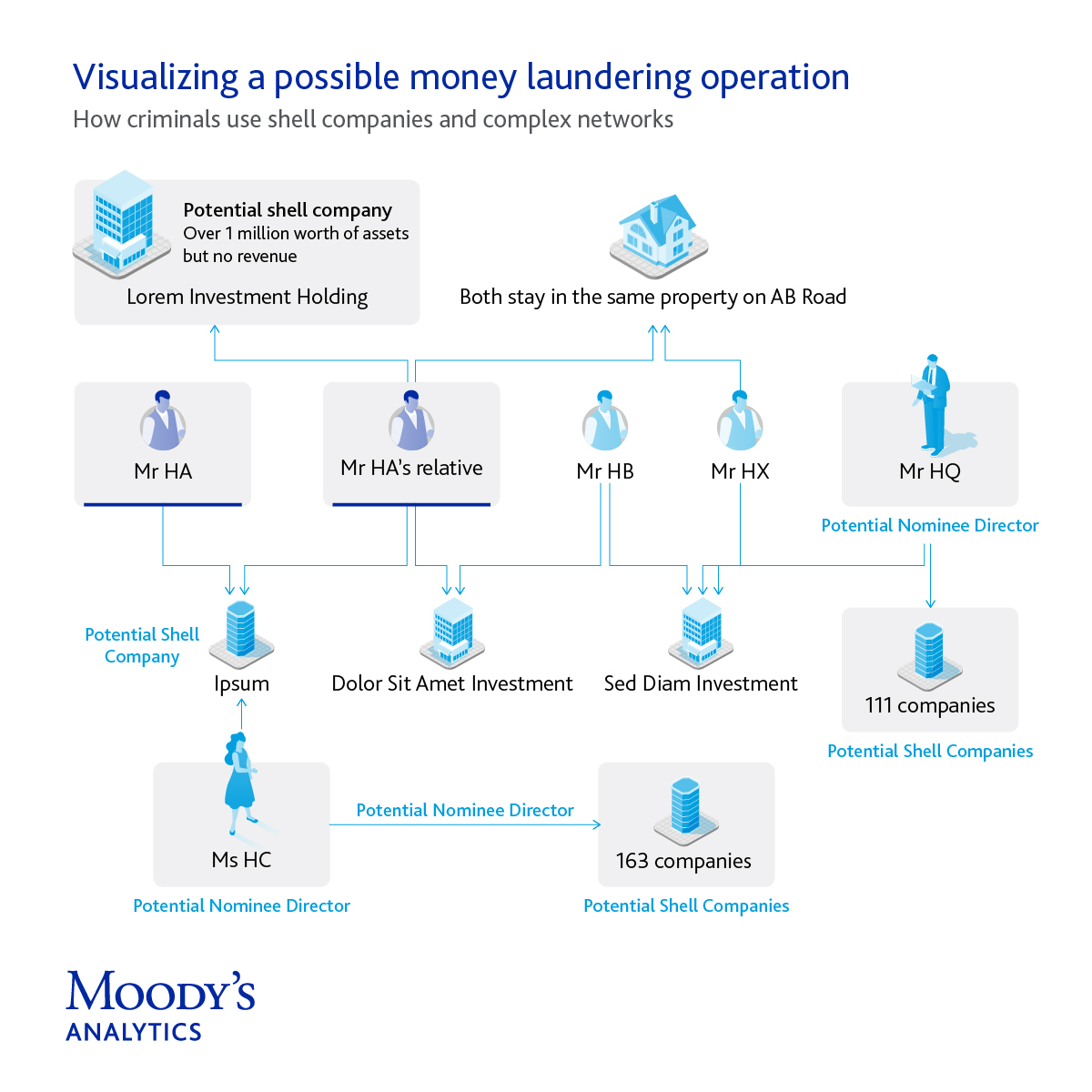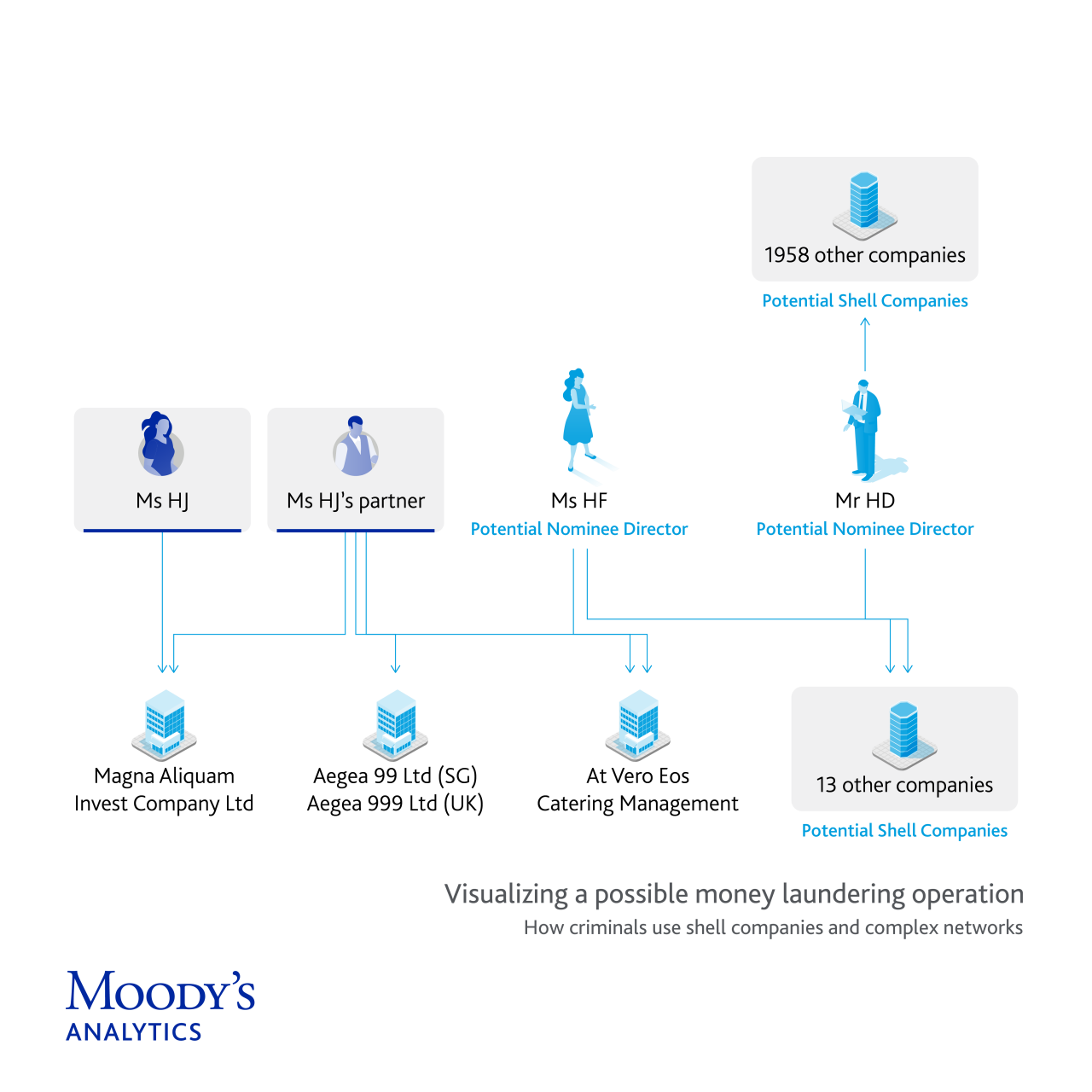
Blog
The complexities of a shell company operation
How intermediaries are at risk of being misused for illicit activity
Shell companies with no significant assets or business operations can be used for both legitimate and illegitimate purposes. Although shell companies are not illegal, financial criminals typically make use of them to disguise ultimate beneficial ownership or to obfuscate the source of funds from illicit activities, such as money laundering, sanctions evasion, or terrorist financing.
It is also not uncommon for financial criminals to engage professional intermediaries – legal persons or trusts and corporate service providers (TCSPs) – to bypass local jurisdictional requirements for ownership disclosure.
Legal persons may also be used to create complicated ownership structures to hide the true beneficial owner of a company, capitalize on complex jurisdictional structures, or facilitate “pass-through” transactions – transactions that go through several layers of legal persons or entities with no real economic intent.
Why certain intermediaries are vulnerable to misuse by financial criminals
Given the nature of these intermediaries, professional services providers and TCSPs are vulnerable to being used to circumvent anti-money laundering (AML) and counter-terrorist financing (CTF) controls when they provide:
- Legal or accounting services
- Establishment or management of local entities on behalf of foreign clients
- Appointment of nominee shareholders, which may conceal ultimate beneficial ownership
- Advice on taxation obligations
Although the Financial Action Task Force (FATF) and other regulatory bodies have highlighted the higher risks and vulnerabilities of money laundering for intermediaries, not all sectors are subject to the same level of AML/CTF due diligence requirements across different jurisdictions. This makes broader enforcement and governance challenging – the lack of standardized corporate transparency standards reinforces the sector’s vulnerability to being misused for illicit activity.
An example of TCSPs being used to facilitate illicit activity
We built a case study based on our extensive database on entity and ownership to highlight the hidden risks arising from shell company operations and complex ownership structures, which are typically used to commit financial crime.
Disclaimer: The names used in the case study are fictitious. No identification with actual persons or companies is intended or should be inferred.
 Figure 1: A complex ownership structure with suspected shell company activity
Figure 1: A complex ownership structure with suspected shell company activity
In Figure 1, there are some common indicators of a shell company that could be used to hide illegal activity:
- Lorem Investment Holding has no revenue but is purported to have over $1 million in assets. This seems an implausible business operation.
- Mr. HQ is a potential nominee director of 111 companies, and Ms. HC is a potential nominee director of 163 companies.
- Given the large number of nominee directorships they both hold, one can reasonably assume that these are shell companies.
 Figure 2: Mr. HD is a nominee director for nearly 2000 companies, which may be indicative of suspicious activity
Figure 2: Mr. HD is a nominee director for nearly 2000 companies, which may be indicative of suspicious activity
In Figure 2, a financial institution monitoring its customers should note Mr. HD’s profile, who is listed as a potential nominee director for nearly 2000 companies.
Deeper analysis of his profile in our database reveals he provides corporate services in his line of work and as such could be acting as a nominated director on behalf of his clients. Although he may not be on any watchlists, or trigger any alerts in the screening process, his nominee directorship is an example of hidden risk and provides indicators of potential money laundering activity.
The importance of AML/CTF obligations for intermediaries and TCSPs
FATF has published guidelines for TCSPs adopting a risk-based approach. Given how susceptible intermediaries and TCSPs may be to misuse by financial criminals, there are also AML/CTF regulations globally that call for customer due diligence (CDD) obligations and adherence to a risk-based approach in these sectors.
Dubai
The Dubai Development Authority has established guidelines for designated non-financial businesses and professionals, including additional guidance for TCSPs.
- TCSPs are obliged to observe AML/CFT regulations and due diligence requirements.
- The United Arab Emirates’ AML/CFT National Risk Assessment has identified professional money laundering as one of the highest money laundering risks.
Hong Kong
TCSPs in Hong Kong are obliged to adhere to the Anti-Money Laundering and Counter-Terrorist Financing Ordinance. With effect from June 1, 2023, Hong Kong’s Companies Registry updated its AML/CFT requirements for TCSPs.
New Zealand
The Government of New Zealand earlier this year announced significant changes to the AML/CFT Act regulations, which will be enforced in 3 stages: June 31, 2023, June 1, 2024, and June 1, 2025.
From July 31, 2023, the definition of a “beneficial owner”:
- Includes a person with ultimate beneficial ownership or control of the customer, whether directly or indirectly:
- Includes a person on whose behalf the transaction is conducted that is a customer of a customer, but only if the person meets the requirement set out in paragraph (1).
From July 31, 2023, there are three new amendment regulations coming in to force for designated non-financial business or professions (DNFBP) who provide trust and company services.
- New Regulation 5F of the amended Act clarifies the definition of a customer for DNFBPs carrying out instructions to form a legal person or legal arrangement.
- New Regulation 5G also clarifies the definition of a customer in the event a DNFBP acts or arranges for someone to act as a nominee director, nominee shareholder, or a trustee of a legal person or legal arrangement.
- The DNFBP’s CDD obligations have been updated to reflect the new definitions under acting as or arranging for someone to act as a nominee or trustee.
- New Regulation 24AF clarifies whether a DNFBP is the reporting entity in different scenarios.
Singapore
The Accounting and Corporate Regulatory Authority (ACRA) first issued AML/CTF guidelines for corporate services providers (CSPs) in 2015. Under these guidelines, CSPs are required to have up-to-date and documented AML/CTF risk management policies and controls.
From May to July 2022, ACRA launched a public consultation on its legislative proposals to enact a new CSP Bill aimed at improving the sector’s compliance and regulatory adherence. The Bill would enhance the country’s efforts in corporate transparency and mitigating risks from money laundering.
How Moody’s Analytics can help
Organizations should augment data with third-party intelligence to build a comprehensive, 360-degree view of customers’ internal and external interactions or transactions. This facilitates creation of a comprehensive risk profile and helps organizations understand risk exposure.
Compliance teams need to be multi-faceted and equipped with the data, technology and tools to drive automation of end-to-end AML/CTF activity to keep pace with regulation, mitigate risk, and manage compliance efficiently.
Please get in touch to find out more about how we can help you detect the risk of shell companies within your business network – we would love to hear from you.